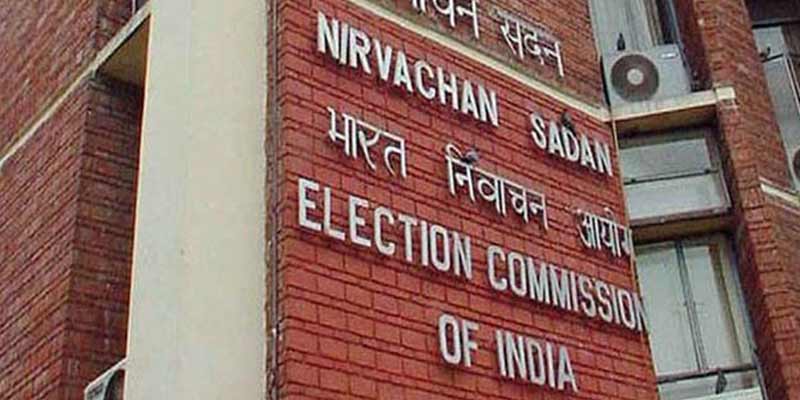- India
- Sep 14
EC delists 86 non-existent unrecognised political parties
The Election Commission of India delisted 86 non-existent Unrecognised Political Parties (RUPPs) and declared additional 253 as ‘Inactive RUPPs’. This action against 339 non-compliant RUPPs takes the tally to 537 defaulting RUPPs since May 25, 2022.
Why was the action taken against parties?
• As many as 86 RUPPs have been found to be non-existent either after a physical verification carried out by the respective Chief Electoral Officers of concerned states/UTs or based on a report of undelivered letters/notices from postal authority sent to the registered address of concerned RUPP.
• ECI had earlier delisted 87 and 111 RUPPs on May 25 and June 20 respectively, thus totalling the number of delisted RUPPs to 284.
• As per statutory requirements under section 29A of the Representation of the People Act, 1951, every political party has to communicate any change in its name, head office, office bearers, address to the Commission without delay.
• This decision against 253 non-compliant RUPPs has been taken based on reports received from Chief Electoral Officers of seven states namely Bihar, Delhi, Karnataka, Maharashtra, Tamil Nadu, Telangana and Uttar Pradesh. These 253 RUPPs have been declared inactive, as they have not responded to the letter/notice delivered to them and have not contested a single election either to the General Assembly of a state or the Parliament Election 2014 and 2019.
• It is also noted that of the above 253 parties, 66 RUPPs actually applied for a common symbol as per para 10B of the Symbol’s Order 1968 and did not contest the respective elections. It is pertinent to note that privilege of a common symbol is given to RUPP based upon an undertaking for putting up at least 5 per cent of total candidates with regard to said legislative assembly election of a State.
• These 253 RUPPs shall not be eligible to avail any benefit of the Election Symbols (Reservation and Allotment) Order, 1968.
How is a political party recognised?
• Any Indian citizen who is more than 25 years old and is registered as a voter can contest elections even without forming a party.
• Similarly, associations can also contest elections without getting registered by the Election Commission. They, however, will not be identified as political parties and hence will not be eligible for availing of benefits under the provisions of the Representation of the People Act, 1951.
• There are many benefits of registering a party. Firstly, the RPA allows political parties to accept contributions voluntarily offered to it by any person or company other than a government company.
• Apart from this, candidates of registered parties get preference in allotment of election symbols. Other candidates are identified as independents and do not get preference in symbol allocation.
• Registered political parties, in course of time, can get recognition as state party or national party subject to the fulfilment of the conditions prescribed by the EC in the Election Symbols (Reservation and Allotment) Order, 1968, as amended from time to time.
Conditions for recognition as a state party
A political party shall be treated as a recognised political party in a state if it fulfils any of the following conditions:
i) The party has to win 3 per cent of seats in the legislative Assembly of the state in the General Election.
ii) The party has to win one Lok sabha seat for every 25 Lok Sabha seats allotted for the state in the General Election.
iii) The party has to secure a minimum of 6 per cent of votes in a state and in addition it has won one Lok Sabha or two Legislative Assembly seats in elections.
iv) The party has to secure 8 per cent of votes in a state in General Election to Lok Sabha or Legislative Assembly.
Conditions for recognition as a national party
A political party shall be treated as a national party if it fulfils any of the following conditions:
i) Secure at least 6 per cent of votes polled in four or more states in the Lok Sabha or Assembly elections, and, in addition, it has at least four members in the Lok Sabha.
ii) It also has to have at least 2 per cent of the total Lok Sabha seats and its candidates come from not less than three states.
iii) It is recognised as a state party in at least four states.
Both national and state parties have to fulfil these conditions for all subsequent Lok Sabha or state elections. Else, they lose their status.
Benefits of getting recognition
• If a party is recognised as a state party, it is entitled for exclusive allotment of its reserved symbol to the candidates set up by it in the state in which it is so recognised, and if a party is recognised as a national party it is entitled for exclusive allotment of its reserved symbol to the candidates set up by it throughout India.
• Recognised state and national parties need only one proposer for filing the nomination and are also entitled for two sets of electoral rolls free of cost at the time of revision of rolls and their candidates get one copy of electoral roll free of cost during General Elections.
• They get broadcast/telecast facilities over All India Radio / Doordarshan during General Elections.
• Political parties are entitled to nominate “star campaigners” during General Elections. A recognised national or state party can have a maximum of 40 “star campaigners” and a registered unrecognised party can nominate a maximum of 20 “star campaigners”. The travel expenses of “star campaigners” are not to be accounted for in the election expense accounts of candidates of their party.
Manorama Yearbook app is now available on Google Play Store and iOS App Store

